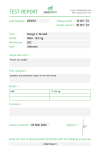Firstly, I realize that I misspoke earlier -- I used 8.4% sodium bicarb, not hydroxide. This Sigma-Aldrich doc linked below states that solutions can be made from either.
In any event, it seems that this stuff doesn't have much of any shelf life once reconstituted. You'd need to reconstitute it as needed, which is maybe why there's such a relatively small amount in each vial -- pretty much one healthy dose.
I later got some NAD+ raw from QSC, and saw almost the exact same pH when I put it into solution. I just don't think they buffered the lyophilizate at all, and probably didn't realize that they needed to.
Thanks. This is helpful.


